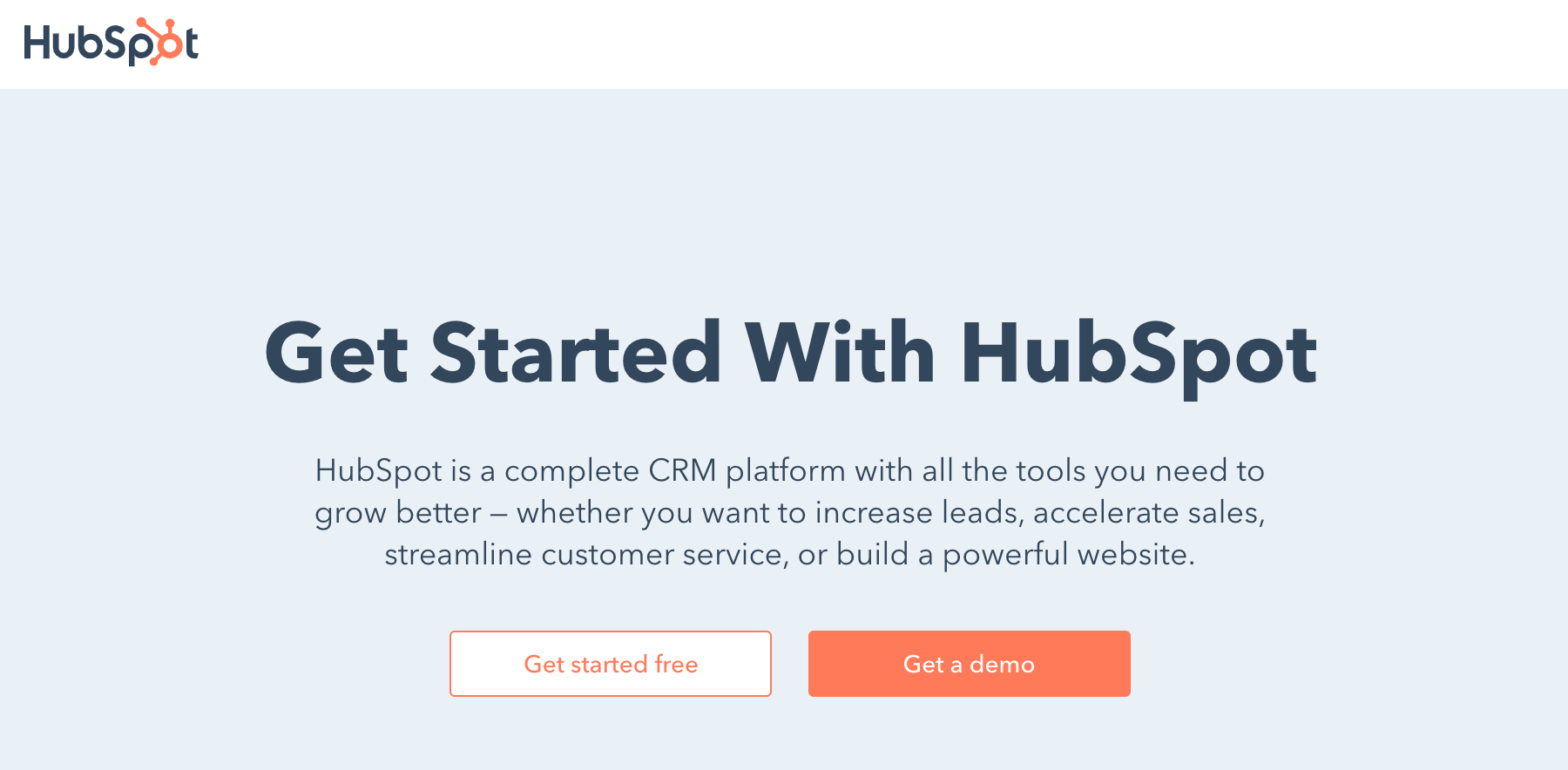Customer relationship management (CRM) is far from a new concept. With companies of different sizes across every industry adopting CRM software, the role of a CRM manager is in high demand.
Yet, so many organizations and individuals still have questions about CRM managers.
What exactly does a CRM manager do? When do you hire a CRM manager? What skills do successful CRM managers possess? These questions and more will be answered in this guide.
Whether you’re looking to become a CRM manager or advance your career in this field, the following information will steer you in the right direction.
What is a CRM Manager?
CRM managers are specialists in customer interactions for a business. It’s their job to implement and maintain processes that facilitate customer relationships across every touchpoint.
In addition to keeping customers happy, CRM managers must understand the business side of customer service. From analytics to marketing, technology, and more, CRM managers need to have in-depth knowledge in several areas.
An effective CRM manager will find a way to identify and segment new leads while guiding prospects and customers alike through the buyer’s journey.
5 Tools to Improve Your Skills as a CRM Manager
The top CRM managers are all well-versed with new technology, including the best CRM software on the market. Here are a handful of exceptional tools that you should consider implementing in your CRM process:
1 — Zoho CRM
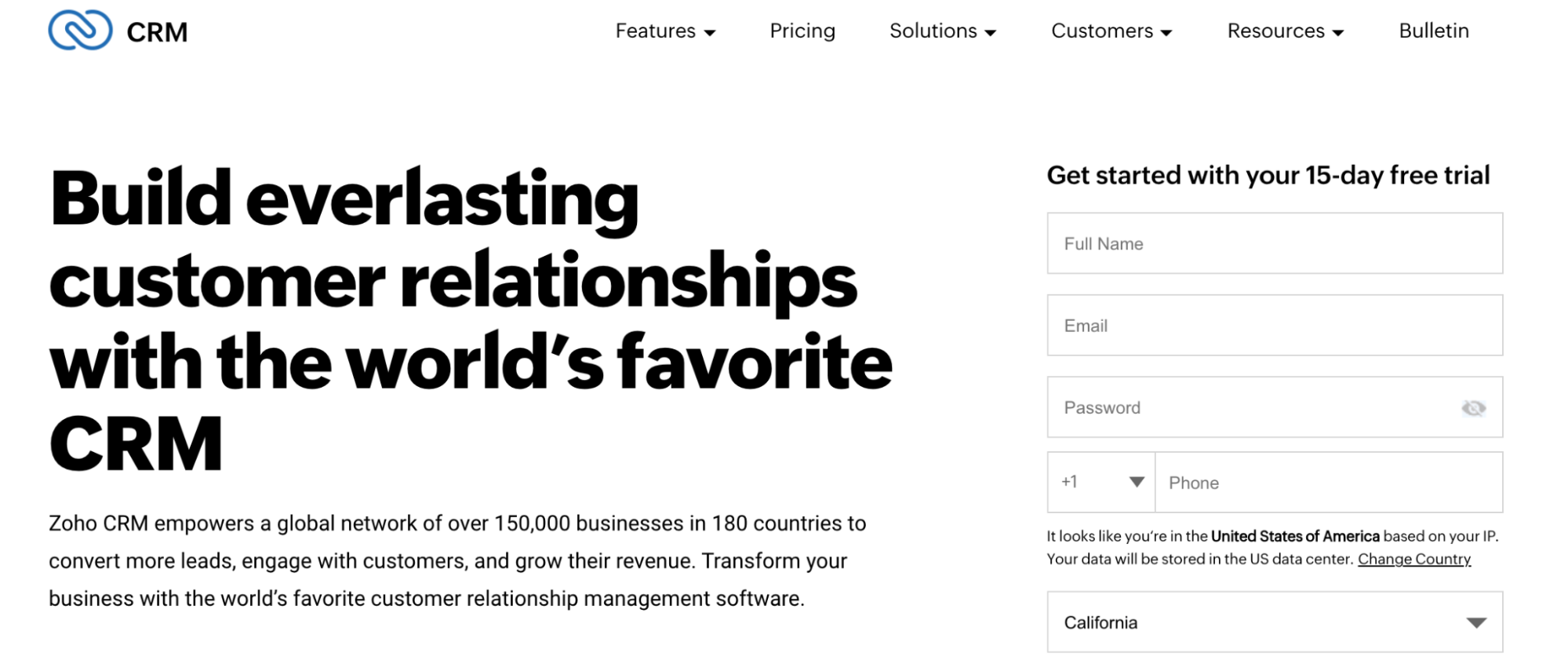
Zoho is a name that many of you might be familiar with. This SaaS provider has an extensive suite of business tools available for different use cases—including one of the more popular offerings, Zoho CRM. If you’re interested in a sales-focused CRM solution, this will be a top option for you to consider.
Over 150,000 businesses in 180+ countries use Zoho CRM to drive engagement and convert more leads. Well-known brands like Bose, Netflix, and Amazon all rely on this software for customer relationship management. With automation features, real-time insights, and AI-driven capabilities, Zoho CRM needs to be on your radar. Sign up now and try it free for 15 days.
2 — HubSpot
Over 100,000 organizations, including Trello, G2, SoundCloud, SurveyMonkey, Suzuki, and the World Wildlife Foundation, rely on HubSpot for customer relationship management. As an industry leader in the CRM software space, HubSpot is an all-in-one solution for sales, marketing, and support.
I like HubSpot because of its simplicity and versatility. Regardless of your business size, industry, or pain points, HubSpot has a solution that can accommodate your needs. Best of all? HubSpot’s CRM is 100% free forever—no credit card required.
3 — Salesflare
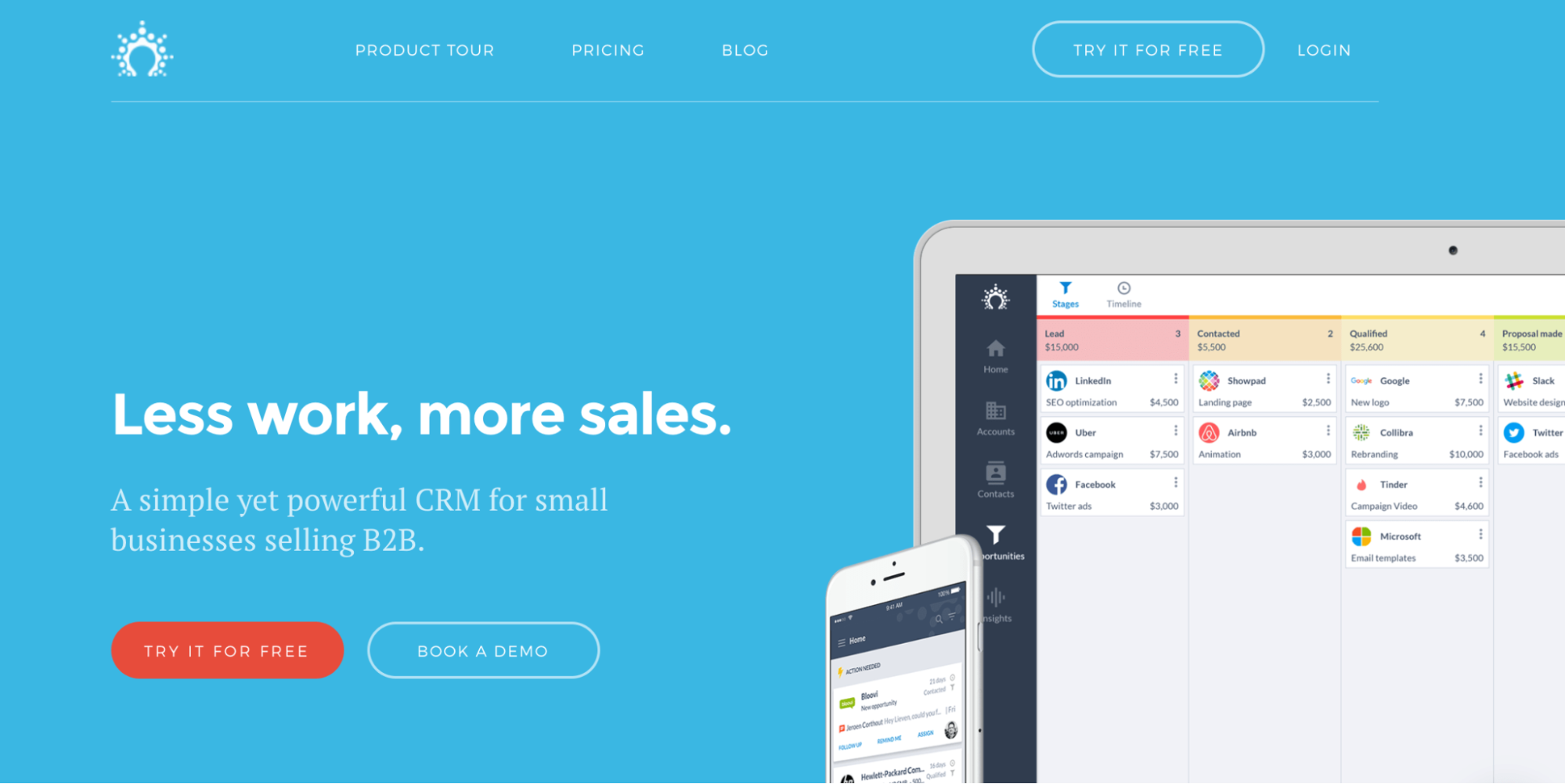
Salesflare is a bit unique compared to other tools in this category—it’s not for everyone. This CRM software is built specifically for small businesses in the B2B space. If you’re looking for a better way to manage your leads and close more deals with business clients, this tool is perfect for you.
Some of the top features and benefits include automated contact storage, automatic meeting logs, and a document folder for every customer. You can use Salesflare to send personalized emails while tracking those messages, links, and website visits. Sign up today and try it for free.
4 — Insightly
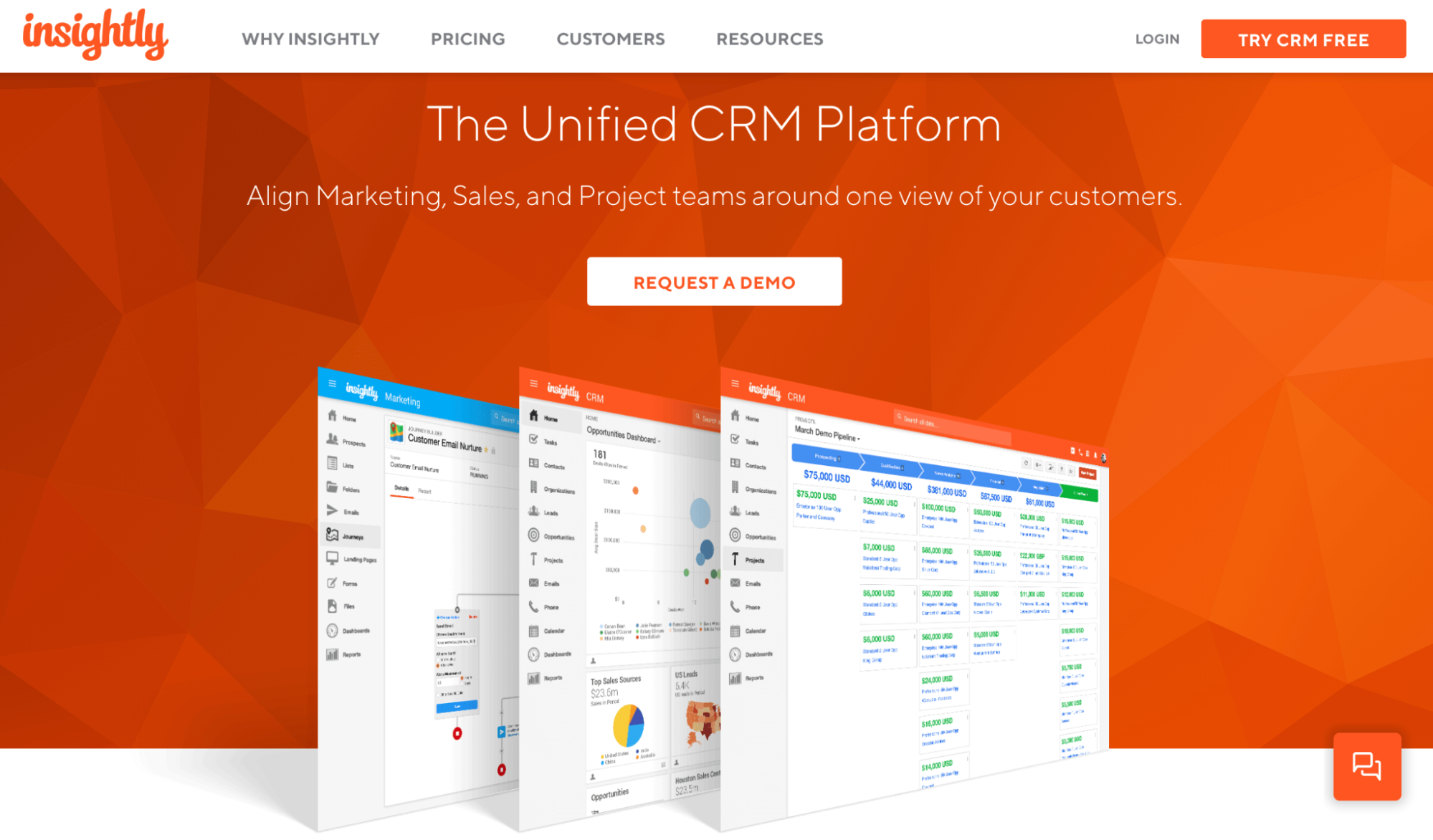
Insightly is an all-in-one CRM solution for marketing, sales, and project unity. This cloud-based platform creates a central source of truth for all of your company’s customer data and customer journey pipelines. As a customer-focused tool, Insightly provides businesses with everything they need to build and nurture relationships with customers.
This CRM allows your team to tailor the sales process according to each lead. Insightly’s versatility is just one of the many reasons it’s used by more than 25,000 companies, including Blomberg, Bosch, and AT&T. CRM plans from Insightly start at $29, and you can try it free for 14 days.
5 — Salesforce
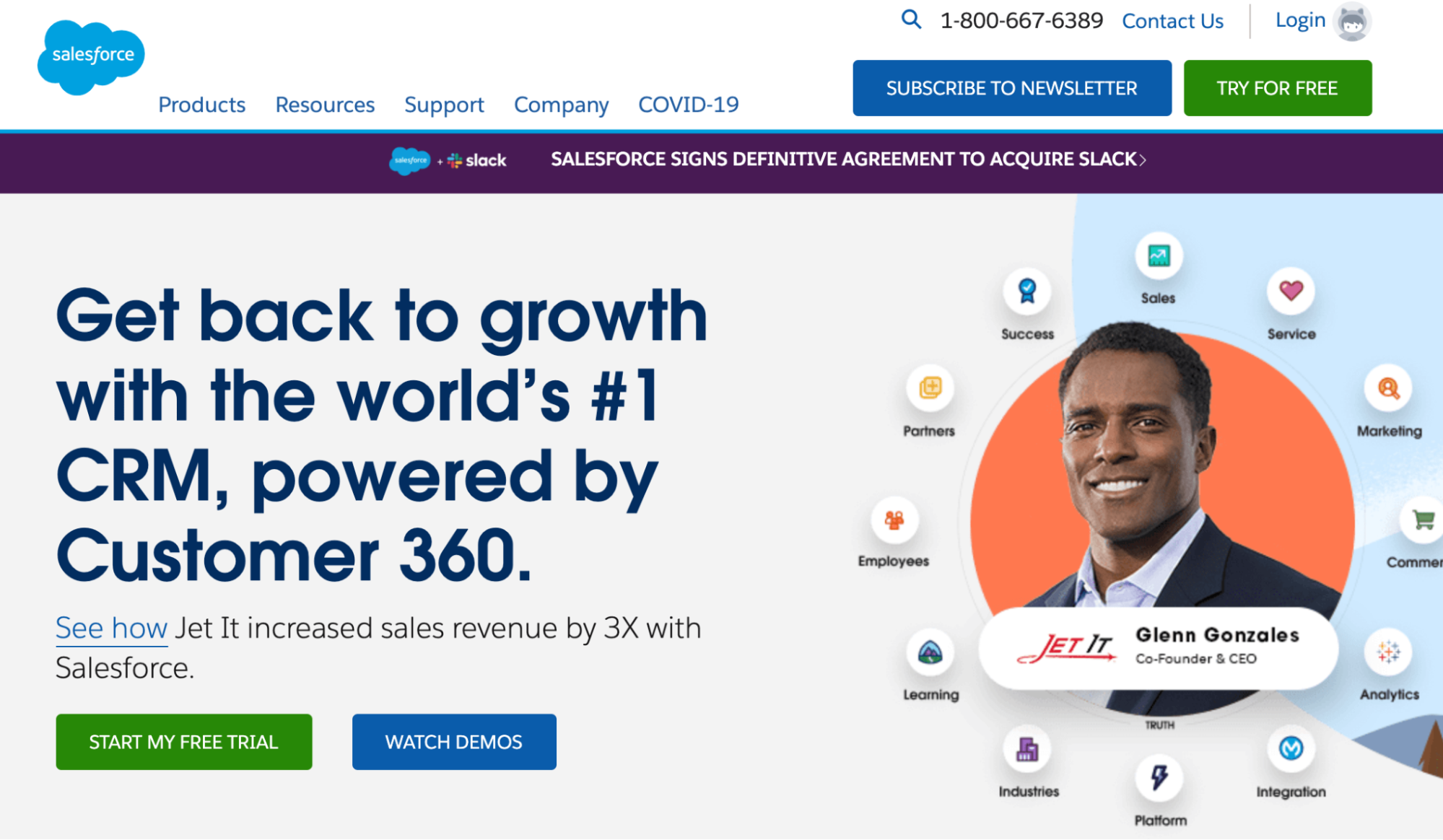
Salesforce has become somewhat synonymous with the term CRM. This company is publicly traded under the stock symbol, $CRM. Salesforce is a tool designed to unify customer journeys between sales, service, IT, and commerce teams.
More than 150,000 organizations rely on Salesforce for customer relationship management. The client list ranges from small businesses and startups to Fortune 500 companies. If you want to implement a proven CRM solution and process, Salesforce is a top option to consider. Try it for free with a 14-day trial.
The Basics of Becoming a CRM Manager
Below we’ll take a closer look at the core components, skill sets, and responsibilities of a CRM manager. This will help guide you through the process of advancing your career in this space.
CRM Certifications
While it’s not an official job requirement, getting a CRM certification will definitely improve your chances of landing CRM management positions. It will also add tremendous value to your skill sets and knowledge in this space.
Think of a CRM certification like a bachelor’s degree or a master’s degree. You don’t necessarily need them for certain positions, but having them on your resume certainly helps.
What makes CRM certifications unique compared to other types of credentials is the fact that they are ultra-specific. Rather than learning broad principles associated with customer relationship management, these certifications primarily focus on a specific CRM software.
For example, there are CRM certifications specific to Salesforce and others specific to HubSpot. Getting a certification from one doesn’t necessarily translate to the other since the tools are very different.
So it’s essential to pursue certifications that you can apply in your work life. If your company already has a CRM system in place, then try to obtain a certification from that software provider. This will not only teach you how to extend the functionality of the toolsets but will also add value to your role as a manager.
CRM Manager Education and Experience
Typically, CRM managers possess a bachelor’s degree. Their field of study is usually related to business administration, IT, finance, economics, or similar programs.
It’s not impossible to become a CRM manager without a four-year degree. CRM certifications, as mentioned above, can help.
In addition to a post-secondary level diploma and a relevant certification, most organizations expect candidates to have several years of experience in CRM before considering those individuals as CRM managers. So it’s unlikely you will become a CRM manager as your first job—you’ll likely need to gain some experience and work your way up the ladder.
The best way to gain this type of experience is by working in a position that puts you directly in front of CRM software daily. Sales, marketing, and customer support roles for modern companies should all be using some form of CRM software.
Even if you don’t want a career in sales, taking an entry-level sales position could ultimately put you in place to pivot and become a CRM manager in a few years.
Management Skills
As with any management position, a CRM manager needs to possess leadership skills. This includes the ability to manage people as well as different projects.
CRM managers must also be able to communicate effectively. They are often dealing with different departments on a daily basis. From sales to marketing and support, clear instructions and lines of communication must be established from the beginning.
It’s the CRM manager’s job to unify the company’s goals across all departments. If every team is segmented without knowledge of what’s happening outside of their department, the organization will struggle.
It’s also important for CRM managers to be detail-oriented. When implementing a CRM solution with specific software, small details can make a huge difference.
Problem-solving skills are also a must-have to be successful in this role. The ability to manage stress and pressure is essential as well.
Creative and Analytical Skills
Managers aren’t typically known for their creative skills. But this trait is crucial for CRM managers.
That’s because a CRM manager will be working closely with marketing teams. They’ll be assisting with content creation, email generation, social media campaigns, and other digital touchpoints for lead generation.
This creativity and open-mindedness will significantly benefit the impact of the CRM process that the manager ultimately implements.
On the flip side, the best CRM managers are analytically-minded as well. They must be able to analyze customer data, monitor customer behavior, and translate that information into the company’s CRM approach.
The balance between these two very different skill sets is tough to find, which is why being a CRM manager is no easy task.
CRM Manager Duties
The CRM manager’s role will vary by the company that they work for. But generally speaking, individuals in this position need to define, evaluate, and execute a CRM strategy with a foundation for customer retention and loyalty.
Some common responsibilities of a CRM manager include:
- Creating a customer segmentation strategy
- Implementing new technology, like CRM software and systems
- Brainstorming marketing strategies and promotional campaigns
- Developing techniques to maximize customer LTV (lifetime value)
- Defining and analyzing success metrics and KPIs
- Developing a customer persona and understanding the customer’s needs
- Discovering new ways to attract leads and get them to convert
CRM managers need to wear lots of different hats daily. They must be able to interact with their team relating to day-to-day tasks of specific departments while focusing on big-picture initiatives for the company as well.
The best CRM managers remain customer-focused. If a customer gets lost in the shuffle during all of these tasks and responsibilities, the primary purpose of this position cannot be fulfilled.
Hiring a CRM Manager
It can be challenging for many business owners or department leaders to decide whether or not to hire a CRM manager. While the benefits of this position speak for themselves, the investment required is significant.
The typical annual salary of a CRM manager falls somewhere in the $80,000 to $120,000 range. So your company needs to have a healthy budget before you can take this step.
CRM managers need to have a clearly defined role within the organization. Meaning you shouldn’t be hiring one just for the sake of bringing someone new on the team.
It’s in your best interest to hire a CRM manager when there are problems that the existing people in your organization can’t solve. If there’s a disconnect between different departments, a CRM manager can help get everyone on the same page.
Small businesses and startups don’t typically have a CRM manager until they show really strong signs of growth. But larger organizations, SMEs, and enterprises usually have the means to fill this position right away.
CRM managers can be promoted from within or hired as completely new employees.
2 Tricks For Becoming a CRM Manager
The path to becoming a CRM manager might seem long and challenging on the surface. But there are a couple of quick tips and hacks that you can apply today for maximum results.
Trick 1: Join a CRM Community
One of the best ways to advance your career in customer relationship management is by building bonds and networking with your peers in this space. Joining an online community is the fastest way to make this happen.
The Trailblazer Community is a prime example of what you should be looking for. This is a group offered by Trailhead, which is the Salesforce learning platform and certification issuer.
There are different groups within the community, events, an idea exchange, collaboration resources, and more. You can connect with other people going through the same process and get tips from those who have succeeded. It’s also a great networking opportunity.
Trick 2: Take An Online CRM Course
To be an effective CRM manager, you must be proficient with modern CRM software. Basic online tutorials won’t be enough to separate you from other professionals in the industry.
Instead, you can further your knowledge by taking different courses and online training sessions.
The HubSpot Academy is one of my favorite resources for this. Classes and certifications from HubSpot Academy are 100% free. In addition to the credentials you’ll obtain from taking these courses, you’ll also learn more about extending the capabilities of HubSpot’s CRM.

